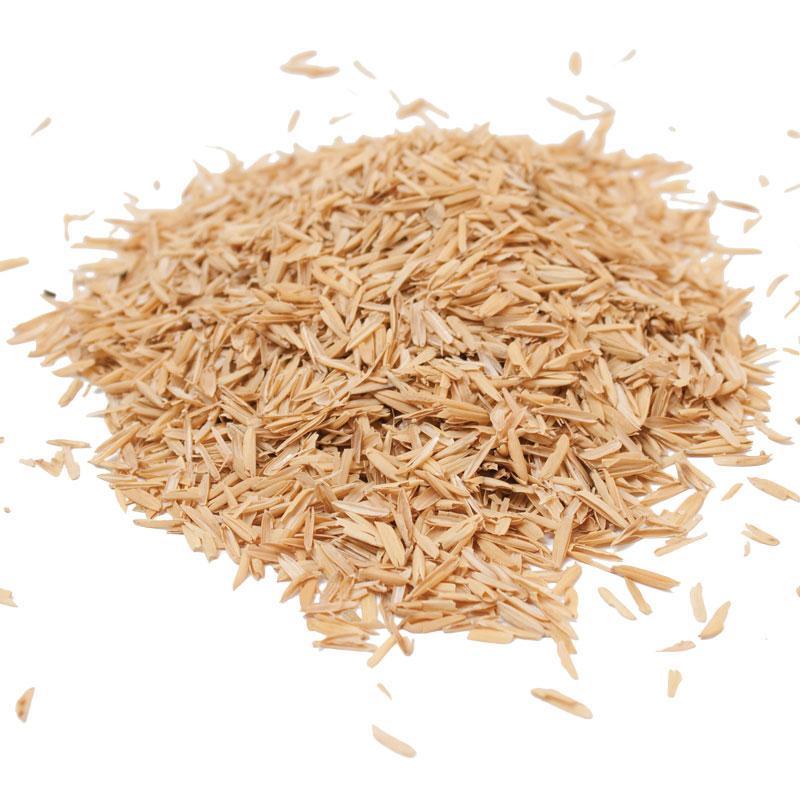Item Number: PSO500
Organic Rice Hulls (50 lb Bag)
A Renewable Resource
This uniquely processed rice hull amendment is a readily renewable resource requiring no mining or land disruption to produce. As so many growers have learned, it is a perfect replacement for perlite in the growing media - providing a less dusty mixing environment, lower basic cost and decomposition over time, while remaining stable during the typical plant production cycle.
OMRI listed and WSDA registered for organic production.
Extremely lightweight and highly compressed when packaged, it generates less waste and reduces storage requirements, handling and freight.
De-compressed, it is 7.5 cu. ft. Its physical size, shape and bulking properties produce optimum air-filled pore space, water-holding capacity and drainage, while its natural color blends with other media components.
Uniquely processed to ensure purity, sized, cleaned and subjected to a series of heat treatments that collectively sterilize the rice hulls and render any residual rice kernels, weed seeds or disease pathogens non-viable.
Greenhouse-proven, offers environmental, horticultural and economical advantages. Growers who rely on it gain sustainability, reduce input costs and sacrifice nothing in terms of plant quality.
Introduction to Rice Hulls
Rice hulls offer valuable benefits for improving soil structure, particularly in clay soils where soil particles tend to compact, hindering root growth. When incorporated into clay soil, rice hulls help break up compacted layers, creating pathways for plant roots to penetrate and access nutrients and water more easily. Their lightweight and rigid nature contribute to enhanced aeration and drainage, promoting healthier root growth and overall plant vigor in various soil types. Gardeners and farmers can rely on rice hulls to optimize soil conditions and support robust plant development, especially in challenging clay soils.
Rice hulls, also known as rice husks or rice chaff, are a byproduct of the rice milling process. They are the protective outer layer of rice grains and are often discarded as waste. However, rice hulls have gained recognition for their various uses, particularly in agriculture and gardening.
The type of soil plays a crucial role in determining the availability of water and nutrients for plant growth. Soil rich in organic matter and well-draining, such as loamy soil, facilitates the absorption of water and nutrients by plant roots, promoting healthy growth and development. In contrast, compacted or sandy soils may struggle to retain moisture and nutrients, leading to stunted plant growth. By improving soil structure and water retention, organic amendments like compost or peat moss can enhance the soil's ability to absorb water and nutrients, ensuring optimal conditions for plant growth and vitality.
Understanding soil texture through soil testing is essential for assessing moisture content and determining the suitability of the soil surface for plant growth. Different soil textures, such as sandy, loamy, or clayey, have varying abilities to retain moisture, affecting plant hydration and overall health. Conducting regular soil tests helps gardeners gauge the moisture levels and adjust irrigation practices accordingly to maintain optimal conditions for plant growth.
Advantages of Rice Hulls Over Other Soil Amendments
Compare rice hulls to alternatives like perlite, vermiculite, and peat moss
Rice hulls, particularly rice husk ash, offer several advantages over traditional soil amendments like perlite, vermiculite, and peat moss. Unlike perlite and vermiculite, rice hulls provide a sustainable and renewable resource from the rice milling process, reducing the environmental impact. Their high silica content enhances the porous structure of the soil, improving water holding capacity and aeration without the need for mining or extraction. Additionally, rice hulls decompose over time, returning valuable nutrients to the soil, unlike perlite, which remains inert. This makes rice hulls a versatile and eco-friendly alternative for improving soil structure, aiding weed control, and enhancing plant growth throughout the growing season.
Highlight benefits such as lower cost, sustainability, and environmental impact
Rice hulls, derived from the rice milling process of paddy grain, serve as a sustainable and cost-effective soil amendment compared to traditional options like perlite. Their high silica content and porous structure enhance water holding capacity and provide effective weed control, benefiting plants throughout the growing season. By utilizing rice husk ash, farmers not only repurpose by-products from rice mills but also mitigate air pollution associated with direct combustion, making it an environmentally friendly choice for agricultural practices.
How to Use Rice Hulls in Different Soil Types
Tips for incorporating rice hulls into sandy, loamy, and clay soils
Incorporating rice hulls into various soil types can significantly enhance soil structure and plant growth. For sandy soils, rice hulls improve water holding capacity and reduce erosion by increasing soil stability. In loamy soils, they enhance aeration and drainage while blending seamlessly with existing components. For clay soils, rice hulls serve as a soil amendment to break up compacted layers, improving root penetration and nutrient access. By utilizing rice hulls, which are a byproduct of the rice milling process and rich in high silica content, including rice husk ash, gardeners and farmers can optimize soil conditions across different soil types and enhance overall plant health.
Specific techniques for optimal results based on soil texture
To optimize results, tailor the use of rice hulls to your soil type. For sandy soils, mix rice hulls to enhance water holding capacity and reduce erosion. In loamy soils, integrate rice hulls to improve aeration and blend seamlessly with existing media. For clay soils, use rice hulls as a soil amendment to break up compacted layers and enhance drainage. Leveraging the high silica content, including rice husk ash, and porous structure of rice hulls from the rice milling process helps achieve better soil conditions and supports robust plant growth across diverse soil textures.
Characteristics of Rice Hulls
Rice hulls are lightweight, rigid, and have a unique composition that makes them valuable in several applications:
Lightweight: Rice hulls are extremely lightweight, which makes them easy to handle and transport. They have a low bulk density, contributing to their utility in various industries.
High Silica Content: Rice hulls contain a significant amount of silica (approximately 15-20%), making them an excellent source of this essential plant nutrient. Silica contributes to the strength and structure of plants.
Low Water Absorption: Rice hulls have low water absorption properties, meaning they do not readily retain moisture. This characteristic is advantageous in some agricultural applications.
Biodegradable: Rice hulls are completely biodegradable, making them an environmentally friendly option for various purposes.
Benefits of Rice Hulls in Agriculture
Rice hulls offer several benefits in agricultural practices, including:
Soil Amendment: Rice hulls can be used as a soil amendment to improve soil structure and aeration. They help break up compacted soils and enhance water drainage, particularly in clayey soils.
Moisture Retention: While rice hulls do not retain moisture themselves, they can be mixed with other organic materials to create a moisture-retentive mulch or soil mix. This can be particularly helpful in preventing soil erosion and reducing water consumption.
Weed Control: A layer of rice hulls can act as a natural weed barrier when applied as mulch. This reduces the need for synthetic weed control methods and minimizes competition for nutrients and moisture among crops.
Slow-release Silica: The high silica content in rice hulls provides a slow-release source of this essential nutrient to plants. Silica enhances plant cell strength, making them more resistant to pests and diseases.
Applications in Horticulture
Rice hulls find applications in horticulture as well:
Potting Mix: Rice hulls can be incorporated into potting mixes to improve drainage and aeration. This is particularly beneficial for plants that prefer well-draining soils, such as succulents and cacti.
Orchid Cultivation: Rice hulls are commonly used as a growing medium for orchids due to their ability to retain moisture while allowing for adequate aeration. This creates a suitable environment for orchid root development.
Other Uses of Rice Hulls
Apart from agriculture and horticulture, rice hulls have additional applications:
Animal Bedding: Rice hulls are used as bedding material for various livestock, such as poultry and horses. They provide a comfortable and sanitary bedding surface while also being easy to clean and dispose of.
Industrial Uses: Rice hulls can be utilized in industrial processes, such as in the production of insulation materials, abrasive products, and even as a component in making building materials like bricks and concrete.
Rice hulls, often considered a waste product, have proven to be a valuable resource in various fields. Their lightweight nature, high silica content, and biodegradability make them versatile for agricultural, horticultural, and industrial applications. Whether improving soil quality, conserving moisture, or serving as a natural weed control method, rice hulls offer numerous benefits to both gardeners and farmers. Additionally, their use as animal bedding and in industrial processes demonstrates their potential to contribute to sustainability and resource efficiency across industries.
For more information, see our companion guide on how to use rice hulls.
Why Order Rice Hulls From Us
At Peaceful Valley Farm & Garden Supply, our rice hulls offer unmatched quality and value, thanks to our meticulous processing methods that ensure purity and consistency. Our rice husks are sourced from reliable rice growing regions and processed under controlled temperature conditions to maximize their effectiveness as a soil amendment. Whether you’re looking to improve soil structure or enhance plant growth, our rice hulls are free from contaminants like fly ash and ash content, making them ideal for your agricultural and horticultural needs. Choose us for premium rice hulls that provide superior performance and contribute to sustainable practices. Shop now to experience the Peaceful Valley difference and elevate your gardening and farming with our trusted products!

Check Your Zone Compatibility:
Compatible with your zone.
Growing Zone for

Our Guarantee To You
Since 1976, we've served our customers at every stage of growing. Please contact us at any time. We are happy to support and assist you.
Shipping Information
Shipping Information
Does not qualify for Flat Rate Shipping.
Due to the size of this product, a $5 handling fee will be added to shipping charges.
Shipping Weight: 55.0 lb
Dimensions: 30.0"L x 20.0"W x 11.0"H
Features
Features
- Biodegradable
- Improves Water Holding Capacity
Characteristics
Characteristics
Use Instructions
Use Instructions
Useful Information
Useful Information
Guarantee
Guarantee
Share

The rice hulls were packaged well enough to survive a hungry bear carrying off the 50# bag. Fortunately I was able to track the rice hull trail and found the bag about 50 meters away. Rice hulls are not proper food for a bear. I am looking forward to using rice hulls instead of perlite!
very happy with the purchase. highly recommended!
Using rice hulls to suppress the weeds in my outdoor container plants. Also using in pathways of new garden area. Cheap for the volume of material. Looks tidier than straw in the 1 gallon pots.
Excellent quality, it is exactly what I wanted.
Richard Byrd
I have not used this product as of yet since I'm waiting for Spring to arrive. It's right around the corner for us here and arrives fairly early in this part of west Texas on the Rio Grande. We've already had sightings of the Texas Bluebonnets and it's only the first week of January. The Bluebonnets plants have been spotted growing so the blooms are only weeks away. Even now when it seems the cold will hang around forever, the bluebonnets let us know that the warmth of Spring is not too far off now for us.
I have ordered composted manure that is mixed with the rice hulls and it's another product that I rely on as well. So, the rice hulls were something I was more than ready to try. Our soils here are almost 100 percent bentonite clay so all of my crops are in containers outside and inside. I make my soils from peat moss, Cherry Stone #2, a good potting soil either purchased here or elsewhere that is not mainly chunks of bark and sticks, the rice hulls, and composted manure. I order my ingredients from here because I can trust the quality. Thank you again.


